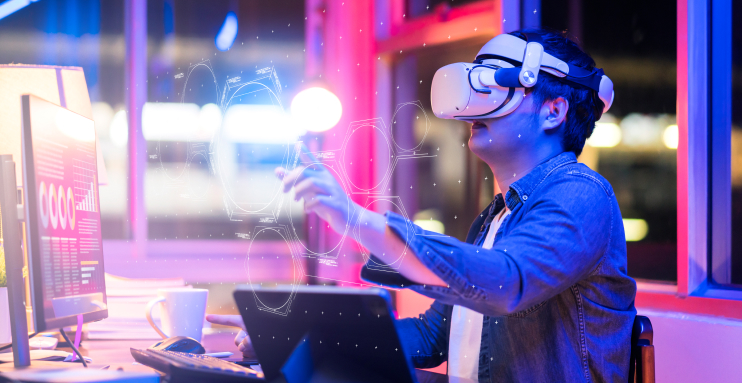
4 Ways Metaverse-based Upskilling Will Revolutionize the Learning and Development Sector
It is now abundantly clear that Metaverse is not merely a passing fad, but rather the bright future into which we are all peering. Did you know? Approximately 82% of executives anticipate that Metaverse plans will be a part of their business activities within the next three years, according to the PwC 2022 US Metaverse Survey.
With the help of Metaverse, online collaboration and communication can be taken to an entirely new level. Virtual reality (VR) headsets of the newest generation are the gateway to the metaverse. In addition to this, data science and spatial visualization can help create immersive learning experiences that boost learner engagement, use cases, and learner expectations.
Alongside the development of technical skills, metaverse avatars can help in developing soft skills, including communication, social skills, and teamwork, among others. Utilizing interactive scenarios, Metaverse could be used to create large-scale upskilling initiatives for soft skill development and leadership competencies at all levels of an organization’s hierarchy. The following are some ways in which the Metaverse will further support individual career goals and contribute to the expansion of upskilling and reskilling programs:
Will Build Upon Blended Learning
Most companies already have VR-based learning as part of their blended learning programs, and as the metaverse grows, it will play an even larger role. In the metaverse, VR learning will incorporate the fundamentals of business skills training in order to solve problems and overcome obstacles without repercussions. Essentially, it will increase productivity by combining people and technology without compromising quality. For instance, a VR-based soft skill development program can help learners in unlearning some antiquated strategies and learn new techniques for navigating the ever-changing business landscape. Upon successful completion of the course, the program can offer enticing incentives, such as contracts, that make learners advance to higher levels of the course. Learning in Metaverse aims to address the challenges of online education, improve the quality of life for those with mobility issues, and support physical learning in a safer environment.
Suggested Read: How Is AR/VR Aiding Employee Trainings In The New Normal?
Will Enhance Experiential Learning
Experience-based learning is the most effective method for acquiring and retaining knowledge, both in and out of the classroom. In addition, organizations are concerned with reskilling and upskilling the workforce with new and long-lasting skills that they can use on the job. Consequently, Metaverse and AR/VR technologies can be advantageous for scaling experiential learning. In this way, the classroom can become an engaging environment in which students can acquire and practice new skills in order to achieve their career goals. Avatar-based learning in the Metaverse will promote collaborative learning and interactive working further. From high-risk training involving complex and heavy machinery or high-risk surgical cases in healthcare to business and leadership training utilizing simulated dispute resolution, the potential and opportunities of this next evolution of learning are vast.
Will Support Social Learning
Working remotely and in hybrid teams has highlighted the importance of social and collaborative learning for career and self-growth. Metaverse offers an expanded selection of virtual working environments and conference rooms. Here, learners can create an online avatar to use in simulated workplace environments for purposes such as interacting with coworkers, participating in group discussions, and collaborating on use case scenarios. Flexibility and experiential learning are enhanced by the utilization of digital, VR-based alternatives.
Suggested Read: Why Social Learning is Critical for the Workforce of Tomorrow
Will Focus on Personalized Learning
The user-centric approach has been prevalent for several years and is here to stay. Personalized learning is a top priority because it increases the likelihood that learners will comprehend the relevant concepts and principles, as well as acquire the necessary application skills. The Metaverse may play a role in enabling mentors to provide a customized, conducive learning environment for their mentees. For example, some learners may benefit from a group-based learning activity, whereas others may prefer a private learning environment. Or, a person with a fiercely competitive nature may benefit from a learning program that includes gamification elements such as competing with peers to complete tasks, completing challenges, leveling up with rewards, etc. The application of data science to the psychology of human learning will be advanced by the virtualization of various forms of training in the Metaverse.
Conclusion
Employers will be able to take advantage of the opportunities presented by the evolving Metaverse as a result of the steady stream of technological advances. While there are a plethora of possibilities and use cases for learning in the Metaverse, organizational leaders must strategically consider how it could most effectively benefit their organizations. As with any technology, there are risks and challenges associated with Metaverse technologies; it all depends on how businesses and leaders develop a comprehensive plan for their use.
Adeptus Tech empowers businesses to make the most of technological developments to promote an environment of continuous learning and improvement. Initiate a conversation with our experts today to learn more.
